Lebanese citizens mobilize to fill the vacuum left by an absent state
In a country accustomed to crises, civil society, volunteers, political parties and prominent citizens are trying to respond to the most immediate needs generated by the Israeli offensive
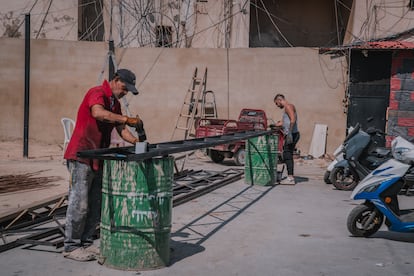

For years, Lebanese citizens have become accustomed to the state being a poor contact point. The economic crisis that began in 2019 accentuated the every-man-for-himself attitude in a country where the solution to basic problems depends more on the religious group one belongs to, one’s surname, or the famous wasta (a contact or connection). Now, the Israeli offensive, which has displaced 20% of the population due to the invasion of the increasingly devastated south of the country, with two other areas under daily attacks, is creating a significant impact on the battered national coffers. Faced with the impotence of the authorities ― Ma fi dawla (there is no state) is a common phrase in Lebanon ― civil society groups, volunteers, political parties, and even prominent citizens have been hastily filling the gaps, such as the young people who distribute thousands of meals to the displaced, or the Palestinian who began to build a medical center because he was under no illusions about what was on the horizon.
Burj Al Barajne is originally a refugee camp that emerged from the Nakba, the forced flight or expulsion by Zionist militias and the Israeli army of 70% of the Palestinians living in present-day Israel between 1947 and 1949. Like the family of Mohammad Al Habet, who originally came from the city of Acre.
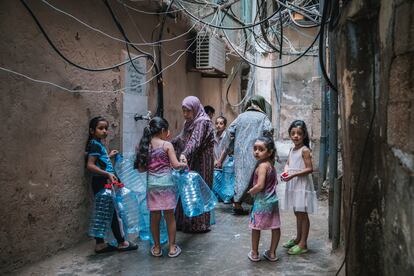
Al Habet, 47, had known for over a month what was coming, so he decided to speed things up. He had the iron structure of the hospital erected before the latest waves of air strikes, which have generated an exodus among the 67,000 or so inhabitants of Burj Al Barajne, which is located next to Dahieh, the Hezbollah stronghold south of Beirut that has been targeted by Israeli bombs. The narrow streets of Burj Al Barajne, crowned by impossible knots of electric cables, have also absorbed Syrian refugees and migrants from Ethiopia, Bangladesh and India.
“We saw clear signs that there was going to be a war. We were sure of it, so we started to think seriously about how we could contribute. We are next to Dahieh and we had the experience of [the war between Israel and Hezbollah in] 2006, so this seemed like the priority,” he explains inside the construction shed he uses as an office.
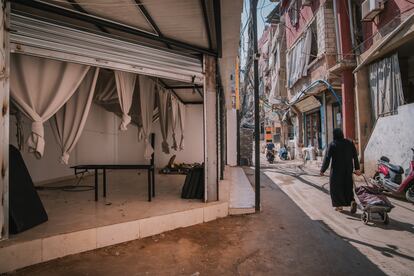
Since the state ― “or what’s left of it,” Al Habet says ironically ― is “only for some people” and Lebanon forbids Palestinian refugees from owning land, he has set aside rented land for the hospital project. He calls it that, even though he does not have the permits. “Technically, we will be an emergency center. If it helps speed things up, I will sign a document promising that we will leave it in the hands of a charity. If the war spreads, it will be needed.” As in 2006, when Israel bombed bridges and the ambulances had a hard time moving from one neighborhood to another, he recalls.
The idea is to set up 72 beds. Munir Saleh, a 56-year-old Palestinian, paints the legs of the beds. “Normally I sell kaak [a sesame bread typical of street stalls], but I am doing this because I can paint and I want to help. If they give me some money in the end, all the better. If not, it’s okay.” Here, “they” are Mohamed Dahlan, the famous and controversial former head of preventive security under Yasser Arafat, who remains popular in the refugee camps partly thanks to the funds he raises in the Gulf, where he lives. His name has been on many lips for months as a potential head of a post-war Gaza administration.
Volunteers for all crises
Initiatives beyond the authorities in hard times are plentiful at this camp, covered in posters calling for the boycott of American brands (over their support of Israel), or bearing the image of Abu Obeida, the masked spokesman for the armed wing of Hamas, who claimed responsibility for the attack on October 7, 2023, in front of the world. In the much quieter and privileged Christian neighborhood of Achrafiye, in Beirut, Mahya el Jawhary takes a break after boiling 500 eggs for the next day. He is 33 years old and employed as a chef by the German Embassy. But since his work is at a standstill, he has traded small portions with signature touches for huge pots of “easy-to-make and easy-to-carry things,” like sandwiches or legumes, to feed those displaced by the Israeli bombing. Some families from the south of the country who have ended up in the neighborhood even come down to see if there are any leftover rations they can take home.
El Jawhary works with Nation Station, a collective born out of the explosion at the port of Beirut in 2020 that has remained active and has suddenly found itself faced with a growing crisis and hundreds of thousands of displaced people. “We mobilized immediately when we started seeing the images of people fleeing and houses destroyed by the attacks. We thought we would have about 10 or 15 volunteers; in the end we have 200,” explains Josephine Abou Abdo, 34, manager of the community kitchen into which they transformed an old petrol station and from which tupperware containers with food are distributed. Up to 2,800 rations are served every day and, even so, Abou Abdo admits, “it is only a drop in the ocean” of what is needed. The volunteers, some of them foreigners, also carry boxes with baby wipes, bottles of water, or diapers.
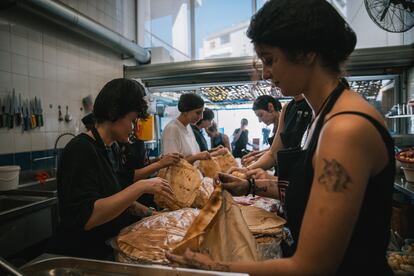
Aley is “the capital of the mountains,” as it is often called in Arabic. Situated between Beirut and Damascus, it is the fourth-largest city in the country and is mainly populated by Druze, as can be seen from the traditional white caps worn by the men in the streets. This is where many of the displaced have ended up, far from the three areas most affected by Israeli bombs: the south, the Beqaa Valley and Dahieh. At the beginning of the crisis, the elderly Druze leader Walid Jumblatt gave them a reassuring message: come to the mountains, we will welcome you, and you will be safe. Within 48 hours, 17,000 people arrived in Aley.
Public schools, which were enrolling students for the start of the school year, have been transformed into shelters. They are dependent on the Ministry of Education, but the closest thing to a state authority is a governor who is not there because she cannot cope. The real authority is a political party that represents the Druze community, although it declares itself secular: the Progressive Socialist Party, which Jumblatt led for decades and which has taken control of the situation. “The government is completely absent,” says the secretary of the party, Ribal Abu Zahy, while children play in the courtyard and women rummage through bags of donated clothing.
There are 390 people in the school and most of them “have not been able to shower for days,” Abu Zahy admits. “Everything you see in the classrooms has been brought by us, NGOs, or the Red Cross. Or local residents. Except for 200 mattresses that the ministry gave us, and there are not enough for everyone,” he adds. And why is a political party in charge? “Who else?” he answers. “We have a lot of presence and structure here... and it was that or nothing.” The area is the party’s stronghold.
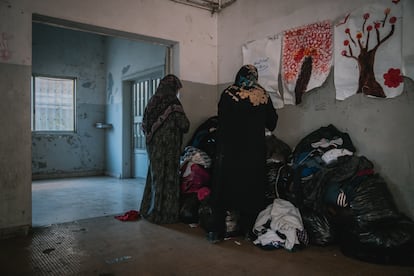
Petra Azzam, a 23-year-old volunteer who studied at the same school, sums up the role of the ministry as follows: “Basically, they gave us the keys to the school. I have bought things with the money my friends send me. They trust me and have donated $500. I send them photos via WhatsApp so they can see what I have spent it on.”
Faeces pile up in the hallway toilets. There is no water in the cistern. “People shower by pouring bottles of water over themselves,” says her friend and fellow volunteer, Marwa Ghrazi. And state water? Ghrazi cracks a half-smile before responding provocatively: “Whose?”
Sign up for our weekly newsletter to get more English-language news coverage from EL PAÍS USA Edition
Tu suscripción se está usando en otro dispositivo
¿Quieres añadir otro usuario a tu suscripción?
Si continúas leyendo en este dispositivo, no se podrá leer en el otro.
FlechaTu suscripción se está usando en otro dispositivo y solo puedes acceder a EL PAÍS desde un dispositivo a la vez.
Si quieres compartir tu cuenta, cambia tu suscripción a la modalidad Premium, así podrás añadir otro usuario. Cada uno accederá con su propia cuenta de email, lo que os permitirá personalizar vuestra experiencia en EL PAÍS.
¿Tienes una suscripción de empresa? Accede aquí para contratar más cuentas.
En el caso de no saber quién está usando tu cuenta, te recomendamos cambiar tu contraseña aquí.
Si decides continuar compartiendo tu cuenta, este mensaje se mostrará en tu dispositivo y en el de la otra persona que está usando tu cuenta de forma indefinida, afectando a tu experiencia de lectura. Puedes consultar aquí los términos y condiciones de la suscripción digital.








































